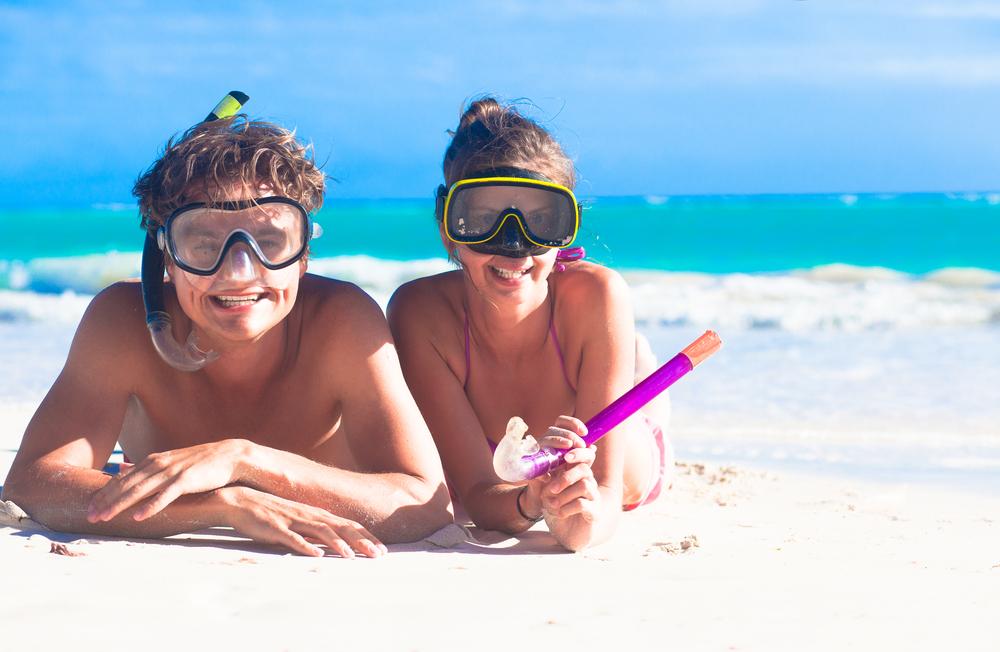How to Stay Safe in the Sun

There are so many different types of holidays, but the by far the most popular trips involve that big ball of light and heat we call the Sun at its hottest. Yes, enjoying the sun is always going to be crowd winner, but it’s also a very dangerous force of nature that needs to be respected…
How to stay safe in the sun
Spending too long in the sun without adequate protection can have a detrimental effect on the skin and body.
In fact, the risk of skin cancer can double if a person has suffered high levels of sunburn five times or more.
Prevention
As we know, the cause of damage to skin is due to the sun’s ultraviolet rays. There are actually two forms of this; UVA (causes skin wrinkling) and UVB (causes sunburn).
Sunscreen is the most common form of protection against harmful UV rays. Everyone’s skin if different. One person may be able to handle more sunshine than others. Here is a table of common skin types and the sun’s effect on them.
Skin Types and Sunburn
Red hair, freckles (extremely sensitive) Sunburn easily, not likely to tan
Fair skin, blue eyes (very sensitive) Usually sunburn easily, tan a little
Most white skin types (sensitive) Sunburn sometimes, tan slowly
Mediterranean, Hispanic, Asian (moderately sensitive) Sunburn a little, tan well
Middle Eastern, Latino, Indian (Minimally sensitive) Rarely sunburn, tan deeply
Dark skin types (not sensitive) Almost never sunburn
This is why there are many different types of sunscreen. It’s vital you choose the right one for your skin ahead of time.
Which Sunscreen for which skin type?
Whilst there is no hard and fast rule for which sunscreen you have to use, there is a handy general guide which advises which cream to use for each skin type. Each cream comes with its own Sunburn Protection Factor (SPF). The higher the number, the greater the protection.
Type I/II – Sunblock: the highest form of protection for skin most susceptible to damage. SPF 50+
Type II/III – SPF 20-30+
Type IV/V – SPF 15-20
Type V/VI – SPF 10 or below
What should i do to prevent sun damage?
Sunscreen is not a complete defence against harmful UV rays, but it is an effective one, provided that it is applied correctly. It is recommended to apply around two tablespoons of sunscreen to your entire body at least thirty minutes before going outside. It should be reapplied every two hours.
One important thing to remember is that you should reapply if you go into water. Many people will make the mistake of thinking the cooling effect of water will keep them safe. It will not. You should select a good water-resistant or waterproof cream for this activity.
It’s important to think about how you apply your sunscreen also. Often, it’s done incorrectly as many people will only apply to the main areas such as face, arms, legs and back.
We spoke to Barry Bolton, editor at NHS Choices, who said;
“While it’s good for you to be out in the fresh air and get some exposure to the sunshine, too much sun can permanently damage your skin. It’s thought that even one episode of sunburn can increase your risk of skin cancer – and more than 100,000 cases are now diagnosed each year in the UK.
“You also need to protect your eyes, as long-term exposure to sunlight increases the risk of a type of cataract and growths on the surface of the eye called pterygia.
“Best advice – whether in the UK or abroad – is to stay out of the sun from 11am-3pm, make sure you never burn, wear a T-shirt, hat and sunglasses, and use sunscreen of at least factor 15.”
Remember that UV rays can also reach the parts of your body you might not have thought about. This includes the front of your feet, the underside of your arms. Even your armpits can be damaged by the sun!
This helpful NHS video shows the idea way to apply sunscreen.
Also, keep yourself safe by doing the following:
- Stay in shade as much as possible between the hottest part of the day (usually between 10am-3pm)
- Do not stay in direct sunlight for long periods of time. Alternate between shade and sun on a regular basis.
- Clothing is important. Try to wear wide-brimmed hats and sunglasses that will block UV rays. Remember, your eyes are at risk as well as your skin.
- If you are concerned after or before a holiday, you might want to visit your doctor for a professional skin exam for peace of mind.
Now that you know how to stay safe in the sun, why not enjoy everything it has to offer with an amazing holiday for the family to Barbados! Contact Royal Westmoreland for information.
